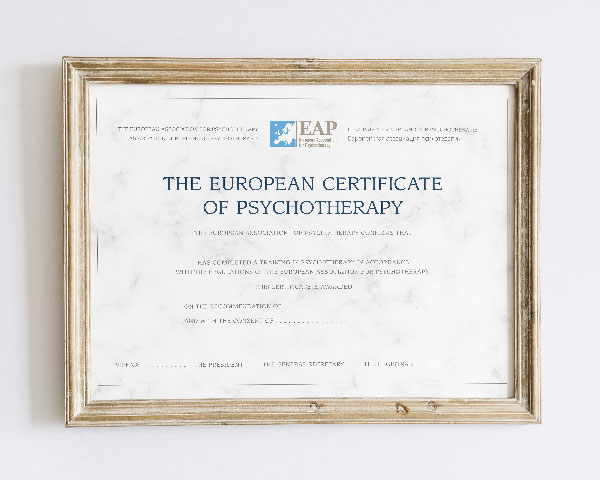European Certificate of Psychotherapy
An European wide standard for psychotherapy education and training
The European Association for Psychotherapy has established the European Certificate of Psychotherapy to ensure the standardisation of the profession of Psychotherapy throughout Europe.
The European Certificate of Psychotherapy (ECP) was established to create a comprehensive Europe wide standard for the profession of Psychotherapy. It ensures equal standards of education and training across Europe.

The ECP is awarded by EAP on application to psychotherapists whose psychotherapy education conforms to the ECP standard.
In addition to the ECP standard, EAP has established and defined the core professional competencies of a European psychotherapist as a set of principles or guidelines in relation to the professional practice of psychotherapy, in all its various forms, across Europe.
The European Certificate of Psychotherapy is currently in general alignment with ISO/IEC 17024 (2012).
Apply for an ECP
There are two possible ways to apply for an ECP, one way is the Direct Award (DA) through one of the European Accredited Psychotherapy Training Institutes (EAPTIs), and the other way is to apply is through Grandparenting procedure that involves recommendation from EAP National Awarding Organization (NAO) and European Wide Awarding Organization (EWAO).
More information | How to apply for an ECP
European Register of ECP Holders
All ECP holders are listed in the European Register of ECP Holders (ECP-R). This tool published on the EAP website enables the search for qualified practitioners all over Europe.
ECP holders receive information about the development of psychotherapy in Europe by e-mail. They may attend the EAP Board meetings as observers but have no voting rights.
European Register of ECP Holders (ECP-R)
Fees in connection with the award of the European Certificate of Psychotherapy
For the administration and maintenance of the EAP website and the ECP-R, ECP holders pay an annual registration fee. The amount varies according to the origin of ECP holders.
More information